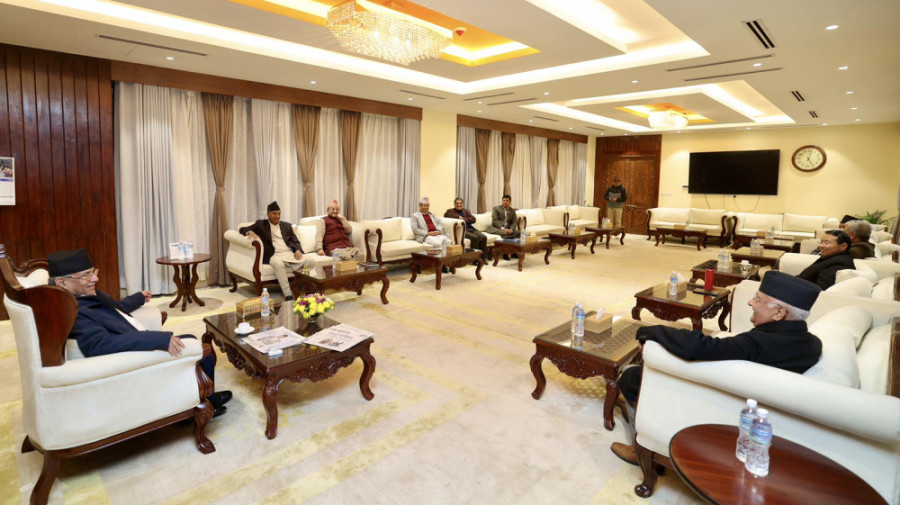National
Big three aim to pass transitional justice bill in winter session
Leaders of Congress, UML and Maoist Centre discussed the issue on Sunday and Monday and have agreed to sit again.
Anil Giri
Finally, a breakthrough on transitional justice is on the horizon.
Top leaders of the three major political parties have agreed to endorse the much-awaited bill to amend the Enforced Disappearances Enquiry, Truth and Reconciliation Commission Act in the upcoming winter session of Parliament.
After months of deliberations at the Law, Justice and Human Rights Committee of the House of Representatives, the committee was unable to reach an agreement on several contentious issues in the bill. This led the top leaders of the parties to discuss the thorny issues. The leaders discussed the issues on Sunday and Monday and have agreed to sit again.
To address concerns of victims of the 1996-2006 Maoist insurgency, which saw around 17,000 deaths, the government initiated the transitional justice process in 2007. However, due to a lack of consensus among stakeholders, the process remains stalled.
There is a major disagreement among the committee members on whether to categorise arbitrary killings or all killings except those that occurred in clashes as a serious violation of human rights. Also, the panel could not agree on what happens in case the victims of human rights violations refuse to reconcile. There was also no solution on how to address the concerns of those who were affected by the conflict even though they were not directly involved in it.
On Sunday and Monday, Prime Minister Pushpa Kamal Dahal, Nepali Congress chief Sher Bahadur Deuba, and leader of the main opposition, CPN-UML chair KP Oli sat together with party’s chief whip and key interlocutors and legal experts in an attempt to seek a consensus on the bill.
“Today’s meeting ended on a positive note with top leaders of major parties agreeing to pass the bill through the upcoming winter session of Parliament,” said Dhan Raj Gurung, Minister for Law, Justice and Parliamentary Affairs.
Earlier, the parliamentary committee had formed a sub-committee in order to hammer out the key differences among the political parties as well as stakeholders of the peace process. After discussing the bill for over five months, the 11-member sub-panel on October 10 presented the incomplete bill to the committee.
“The top leaders discussed the four contentious issues,” said Mahesh Bartaula, chief whip of the CPN-UML told the Post, adding, “They have opened discussions on the disputed issues, but have yet to reach any consensus.”
Leaders in the meeting also agreed to make the bill victim-centric and address concerns raised by the international community.
CPN-UML chief Oli has been stressing that the bill should address the concerns raised by the victims and the international community, and the Supreme Court’s verdict, among other things.
The current process has failed to incorporate those who were killed and injured in landmine explosions during the decade long insurgency. Also, there is a disagreement regarding sentence reduction. While there is consensus that cooperating perpetrators may receive reduced penalties, the extent of the reduction has yet to be agreed upon.
Although it has been over eight years since the Supreme Court ordered a revision of the Act, it has yet to be amended. The court in 2015 had struck down around a dozen amnesty provisions in the Act, directing the government to amend it in line with international standards and practices. It asked for the categorisation of violence as ‘serious’ and ‘non-serious’ and ‘worthy of amnesty’ and ‘unworthy of amnesty’, depending on their severity. Though the bill has two categories of human rights violations, it has listed murder under non-serious violation.
The lawmakers representing the ruling and opposition parties are sharply divided over the categorisation of crimes. Now these contentious issues will be resolved by the top leaders if the parliamentary panel fails to find a consensus.
“From the government’s side, we got an assurance that they are positive to amend the bill to make it victim-centric,” said Bartuala, adding, “So, we can say our discussions are heading in a positive direction.”
The current bill envisions allowing four years each to the two commissions to investigate all cases. The truth commission has registered 63,718 complaints, while the disappearance commission has around 2,400 cases.
Although legal experts say the constitutional authority to remove difficulties is to be used only in rare cases, the government can grant extensions to the commissions using the same provision.




 13.12°C Kathmandu
13.12°C Kathmandu














